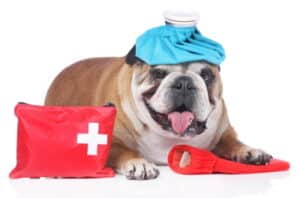 Research suggests that 1 in every 3 pets needs emergency veterinary treatment each year. As scary and unexpected as pet emergencies can be, knowing what to do in a first-aid situation is extremely important.
Research suggests that 1 in every 3 pets needs emergency veterinary treatment each year. As scary and unexpected as pet emergencies can be, knowing what to do in a first-aid situation is extremely important.
Acting fast and taking the first steps of care before getting to the vet can save your pup’s life. While there are some similarities between human and pet first aid, knowing how to treat animals in an emergency is valuable for pet owners.
Below are our top 4 tips for emergency pet care.
Know Whom to Contact in a Pet Emergency
Call your emergency veterinarian, primary care veterinarian in Charleston SC, or poison control to get immediate help. You’ll be asked a few questions, so make sure you know the answers to the following:
- How much does your pet weigh?
- How long has the pet been exposed to a toxic substance?
- Name and description of the toxic substance
- How much of the toxin the pet ingested
This information will help a vet know the next steps to take to give your pet the best care.
Create a Pet First Aid Kit
Being prepared with essential supplies and information can go a long way toward a positive outcome during a pet emergency. Because pet emergencies can be sudden and unexpected, a first aid kit with the right supplies can help you feel more confident and improve response time.
You can purchase a pet first aid kit online or put one together at home. If you prefer building a first aid kit for your fur babies, below is a basic list to get you started.
Wound Care and Bandages
Injury to your pet’s skin is probably the most common pet emergency. In case of any cuts, sprains, or wounds, ensure you have the following:
- Sterile gauze pads
- Antiseptic wipes
- Non-stick, self-adhering bandages and gauze roll & tape
- Styptic powder
- Antimicrobial wash and ointment spray (Use the smallest amount possible to reduce the risk of ingestion)
- Cotton balls and Q-tips
Medications
Always consult a vet before giving your pet any medication. Otherwise, the following medications will relieve your pet before going to the veterinary clinic in Charleston, SC:
- Sterile eye-wash solution
- Antacids
- 3% hydrogen peroxide
- Antihistamine for mild allergic reactions
Tools
Just like a veterinary diagnostic lab, ensure you have the right tools to administer first aid to your pet correctly. Don’t forget to sanitize all the tools before use. Important tools to have include:
- Digital thermometer and lubricant
- Magnifying glass
- Tweezers
- Needle-less syringe for flushing eyes or administering medications and fluids
- Small flashlight or headlamp
- Blunt-tipped scissors for cutting bandages and removing hair
Miscellaneous
It’s best to always prepare for the unexpected. Other miscellaneous pet emergency care kits to have at home include:
- Card with contact information for the nearest 24-hour emergency vet clinic and animal poison control
- At least two pairs of rubber or latex gloves to protect you and your pet
- Extra leash and temporary muzzle for dogs
- Treats (don’t feed a dog that can’t swallow normally, is vomiting, or having seizures)
- Collapsible water bowl and a bottle of water
- Hand sanitizer
- Blanket or towel
- Current pet photo and your pet’s medical history in a waterproof bag
It’s worth noting that the first aid kit should be customized to your pet’s needs.
Learn How to Handle Common Pet Emergencies
While having a first aid kit shouldn’t be a substitute for veterinary services, emergency treatment can save your pet’s life before you get to your vet clinic in Charleston SC.
Below are emergency pet care tips for different scenarios.
Poisoning and Exposure to Common Toxins
Generally, any products that are harmful to human beings are bad for your pet. These include household cleaning products, antifreeze, and rodent poisons. However, certain food items lcan also harm your pet.
Check the product label for exposure instructions if your pet’s eyes or skin is exposed to a toxin. If it says to wash your hands with water and soap, do the same to your pet’s skin. Remember to call a veterinarian in Charleston, SC immediately.
Knowing the warning signs of poisoning or toxin exposure is also crucial. Call animal poison control immediately if you notice the following symptoms:
- Seizures
- Loss of consciousness
- Difficulty breathing
- Drooling
- Vomiting
- Disorientation and staggering
Bleeding
A pet in pain can be unpredictable, so ensure you take precautions like gently restraining and muzzling them. Apply pressure to the bleeding wound with clean, thick gauze. Hold the pressure for at least three minutes or until the blood starts clotting.
Use an elastic band or gauze to create a tourniquet for a severe wound located on the leg, then apply a bandage and pressure. Loosen the pressure every 15-20 minutes for 15 seconds. Visit a veterinarian as soon as possible because severe bleeding can be life-threatening.
Choking
Common symptoms of choking include difficulty breathing, blue-tinged lips or tongue, and excessive pawing at the mouth. When giving first aid to a choking pet, exercise caution as they’re likely to bite in the panic.
Look into the pet’s mouth to check for a visible foreign object. If you can see it, use tweezers or pliers to remove the object gently. If you can’t reach the object, get the pet to a vet clinic immediately.
If the pet passes out, apply firm pressure to the sides of the ribs with both hands. Laying your pet on the side and striking the rib cage with the palm of your hand 3-4 times can also push the object out.
Know How and When to Muzzle
Even the gentlest, most docile dogs can bite when in pain. Knowing how and when to muzzle can prove helpful when you need to render first aid to a dog that’s snapping jaws. While you may never need this skill, here are a few tips that can help:
- Only muzzle when a dog is in distress
- Don’t leave a muzzled dog unsupervised
- A muzzle is not a training tool
- Only use a muzzle for short periods
Being Prepared for Emergency Pet Care Can Save Your Furry Friend
Knowing how to handle emergency pet care issues like choking, bleeding, and toxin exposure can make all the difference between a small scare and a tragedy. Whatever the nature of the emergency, remember that first aid is not a substitute for veterinary care.
Additionally, consider a regular pet check-up to diagnose underlying conditions that may lead to a medical emergency.
Hampton Park Veterinary is always available to ensure your pet receives the best care during an emergency. We also provide dog wellness exams, pet preventative care, pet dental care, and veterinary surgery.
Contact us today to schedule an appointment for any of the above services.

